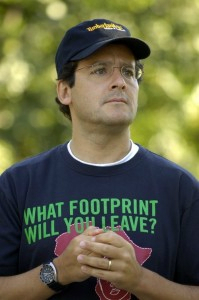Hailing from a town near Chernobyl, Nathan Swartz was one of many Russian immigrants to the US in the early 20th century. In 1918 he started working as a shoemaker in Boston. After more than 30 years of hard work, Swartz saved enough to invest in a small shoe company (initially purchasing just half a share!) By 1955 he bought the company outright, and turned it into a family business with his sons. In 1960, the Swartz family released a new shoe made with their patented injection-molding technology that bound leather without using stitches, creating a perfectly waterproof and durable shoe. One shoe model was called Timberland, and became so incredibly popular worldwide, that the company changed its name to the Timberland Shoe Company. Timberland soon became a household name and expanded to clothing, backpacks, and other products. Today, it is a multi-billion dollar company which was run, until recently, by Jeffrey Swartz, grandson of founder Nathan Swartz. Jeffrey has become renowned for pushing corporate responsibility, green initiatives and worker’s rights. His employees receive 40 hours of pay every year to do charity work, and $3000 stipends to buy hybrid cars. Timberland has planted over one million trees worldwide, is carbon-neutral, and recycles rubber from tires. It has been listed on CNN’s “100 best companies to work for”. Meanwhile, Swartz has become a noted philanthropist and ‘social investor’. He is also a proud Orthodox Jew, waking up at 4 am each morning to study Torah. Timberland continues to be a shoe adored by construction workers and rappers alike. It has even lent its name to hit music producer Timbaland, who was nicknamed after the iconic shoe.
Words of the Week
…A shy person cannot learn, a short-tempered person cannot teach; nor does anyone who does much business grow wise.
– Hillel (Avot 2:5)


